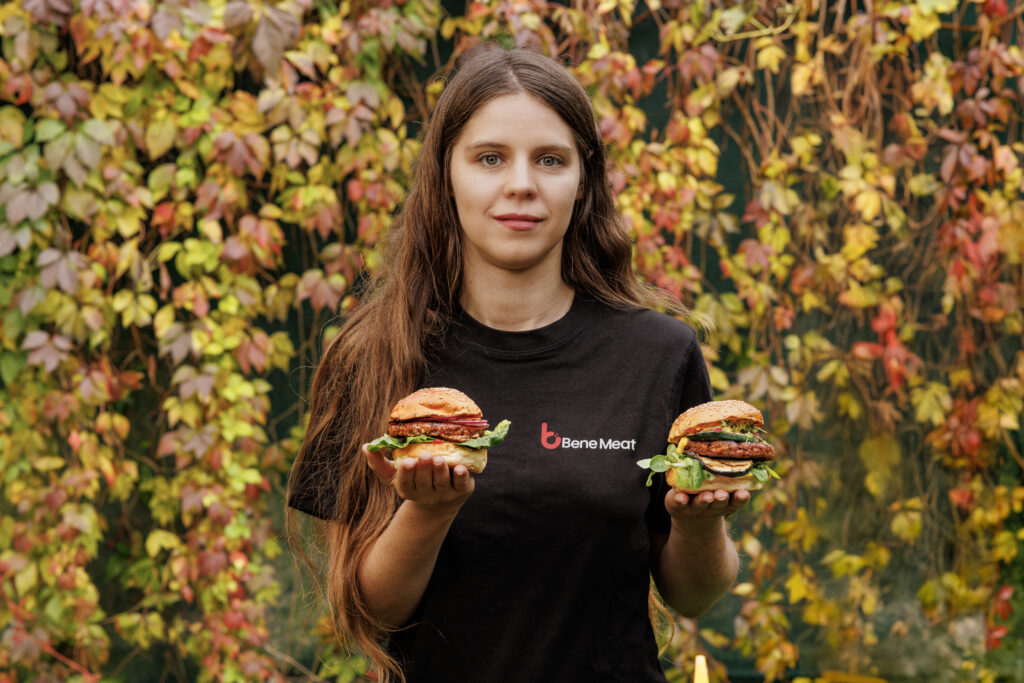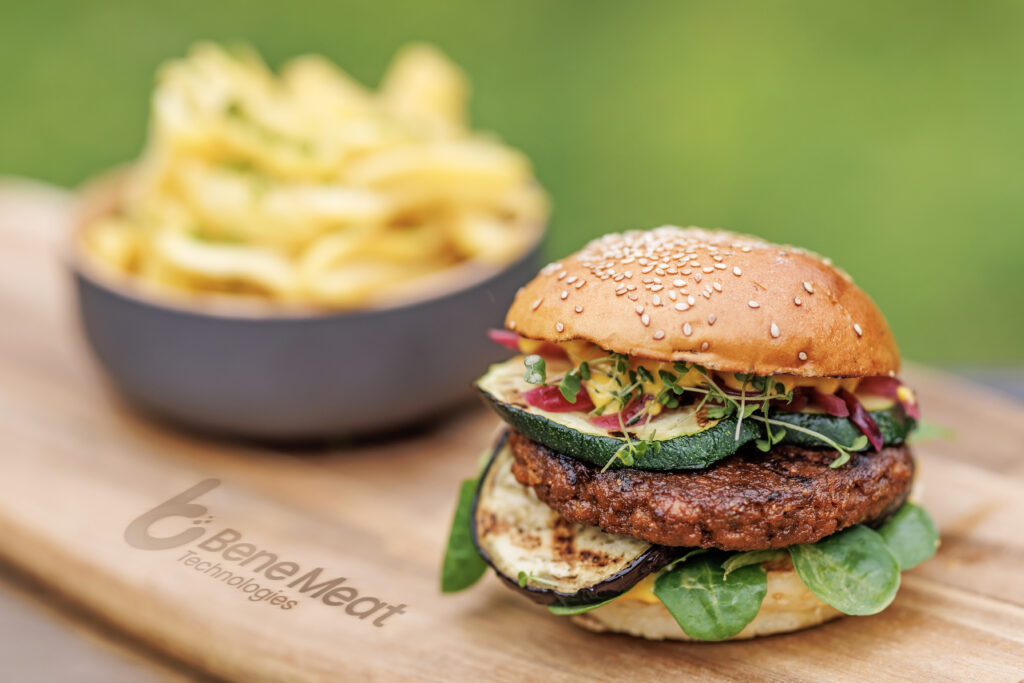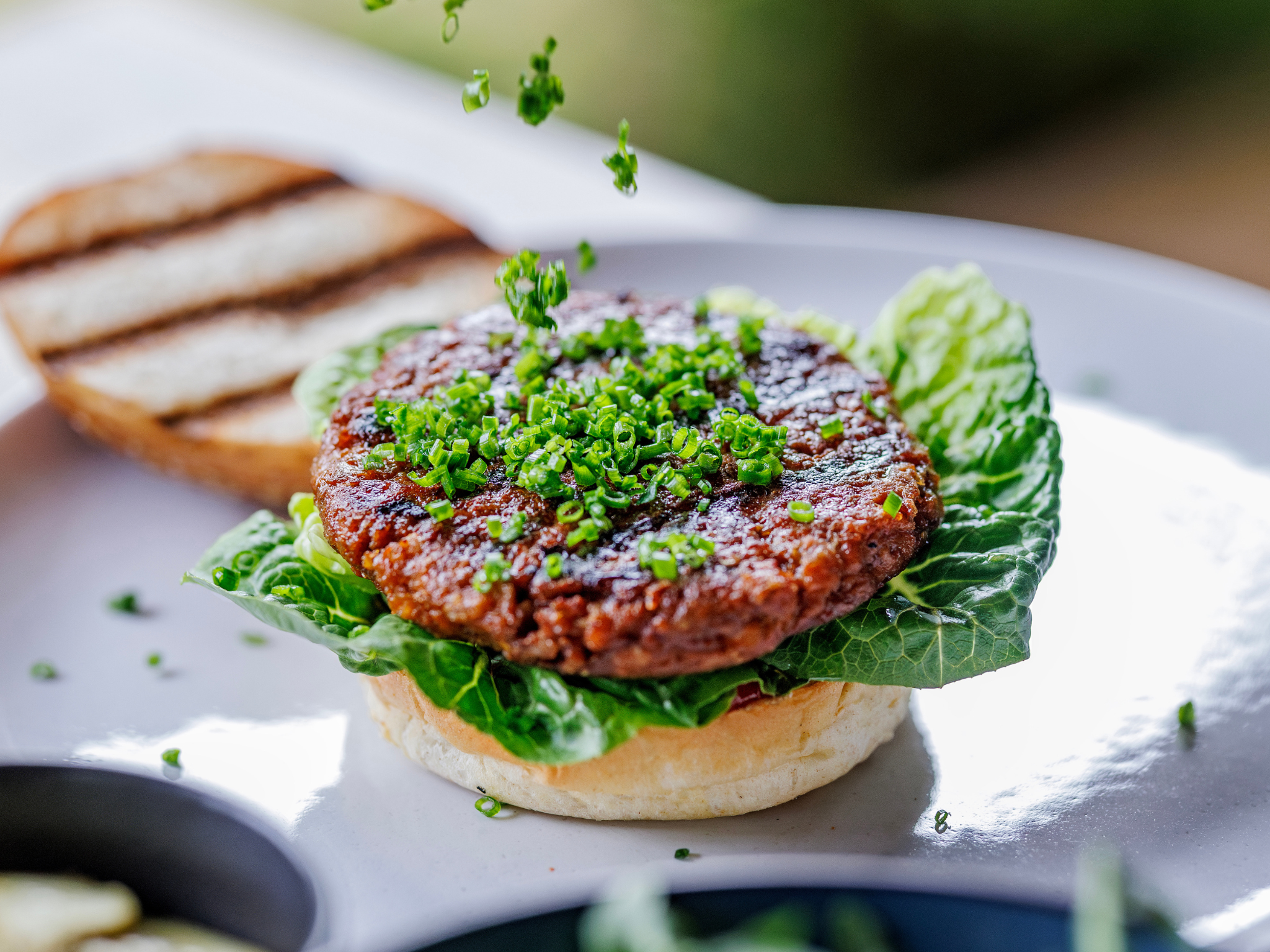Czech Startup Introduces Cultivated Burgers Priced the Same As Premium Beef
5 Mins Read
Prague-based Bene Meat Technologies has produced its first cultivated burger, which it says will be at price parity with premium beef. It has also hinted at an update on its pet food venture.
Bene Meat Technologies, the Czech producer of cultivated meat for humans and pets, has introduced its first burger patty, which would cost consumers the same as premium beef.
It marks the startup’s first innovation for human food applications, following the registration of its cultivated pet food as an EU feed material last year (which is separate from an official regulatory approval for sale).
Human food was always part of the startup’s plans, and the claim that it can offer cultivated meat at price parity with premium conventional versions would resonate with consumers worried about the high costs of these proteins, and signpost an advancement in the industry’s bid to make price-competitive products.
“Developing cultivated beef for human consumption has been our primary goal from the outset, especially due to the significant environmental impact associated with traditional beef production. Along the way, we have expanded our efforts to include other cell lines and markets,” Tomáš Kubeš, head of strategic projects at Bene Meat, tells Green Queen.
The company has been working on chicken cell lines too, although Kubeš stresses that this is not the current focus. He also confirms that Bene Meat is working on pet food simultaneously. “We have invested significant time and resources into the development of our cultivated pet food,” he says, hinting at a “significant update” on this front “in late 2024 or early 2025”.
In-house media and equipment help lower costs

Bene Meat uses a “classical cell cultivation process”, beginning with isolating the cell tissue or acquiring it from a cell bank. Then, it selects and develops the appropriate cell line, either using natural adaptation techniques or genetic modification, depending on each line’s specific requirements.
“Once the cell line is optimised, we scale up the process to suspension cultivation, allowing us to efficiently produce the necessary volume of cells,” explains Kubeš.
He says that the startup has always focused on designing everything with cost and scalability in mind: “We deliberately avoided expensive media ingredients or overly complicated processes from the start.”
Bene Meat’s burger doesn’t use fetal bovine serum, the controversial and expensive growth medium that more and more cultivated meat producers are moving away from. “We develop everything in-house, including media recipes and equipment,” Kubeš says, declining to divulge further details “as many of our improvements are part of our proprietary know-how”.
But he adds: “Our cultivation equipment is designed to meet the food safety standards, and we are avoiding some pharmaceutical solutions that, while well established, are not inherently scalable in a cost-efficient way.”
The startup currently operates a small-scale pilot plant, which it uses primarily for product development and feeding trials. “In parallel, we are constructing a larger-scale facility with a projected production capacity of approximately 200 tons per year, which is expected to be completed in 2025,” says Kubeš.
Scaling up production volumes while driving down costs have become two major barriers standing between cultivated meat and wider commercialisation. The industry has lowered costs by 99% in the last decade, but McKinsey suggests it will still take at least until 2030 for it to reach price parity with meat.
Bene Meat’s burger could feature 90% cultivated beef cells

Several startups have recently made strides in pursuit of lower prices, including Bene Meat’s competitors in the pet food space, Meatly and BioCraft Pet Nutrition. The former – the first to receive regulatory approval for cultivated pet food – has created a protein-free culture medium to get costs to just £1 ($1.30), while the latter has developed a plant-based medium that could bring market prices down to $2-2.50 per lb.
Culture media are usually the most expensive parts of cultivated meat production, costing hundreds of dollars. It’s why companies and researchers alike are coming up with solutions, whether via continuous manufacturing processes or stem cell metabolism.
Still, there’s a long way to go before these prices are realised in a consumer context. Good Meat’s chicken, the only cultivated meat currently available in supermarkets, has a retail price equivalent to over $20 per pound – and cultivated cells only make up 3% of the product, the rest being plant-based.
These formats, known as hybrid meats, have been touted as the only viable way for cultivated meat to come to market in the short term. Companies have been experimenting with inclusion rates of up to a third of the product, but Kubeš says Bene Meat’s burger only contains “spices and other minor ingredients” aside from cultivated beef.
“We are testing various formulations, with some recipes containing up to 90% cultivated meat,” he notes. “We are still evaluating the best recipe for the commercial product.”
That said, it will be a while before this burger makes it to your dinner table. The startup would need to go through food safety regulators in each market it plans to launch in, including the EU, which has proved to be the most complex framework for companies (only one startup has filed for approval in the region).
“We are currently evaluating the best strategy for seeking regulatory approval for our cultivated beef,” says Kubeš. “While we are exploring several markets, including the EU, we have not yet finalised where we will file first. Our decision will be based on the regulatory landscape and market readiness in each region.”
The startup recently announced that it has successfully stored over 5,000 samples in a “cutting-edge” cell bank, and submitted a dossier for its pet food to the US Food and Drug Administration. “Our pet food is based on cultivated cells of mammalian origin,” he says, adding that the cell line is a trade secret, and that he “cannot confirm or deny it is beef”.
Bene Meat’s total funding amount is under wraps, but Kubeš confirms that it is not actively seeking investment: “We have successfully secured all necessary funding for our announced activities through our strategic investor, BTL Medical Group, which has provided the financial support required for our ongoing projects and upcoming milestones.”



